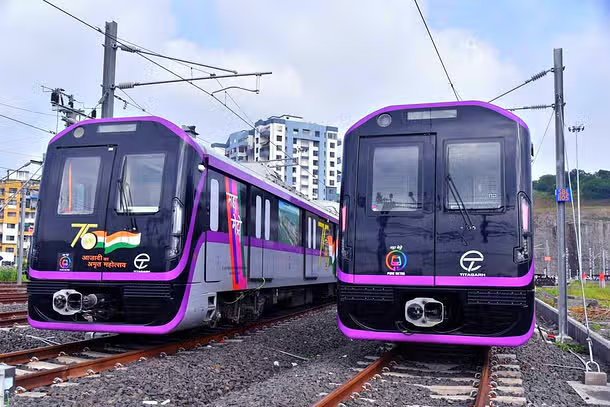Pune Metro Expansion Gains Approval, Enhancing Connectivity to Loni Kalbhor and Saswad
Pune’s metro network is set for a significant expansion as the Pune Municipal Corporation (PMC) has approved two new metro corridors connecting Hadapsar to Loni Kalbhor and Hadapsar to Saswad railway station. The project, with an estimated cost of ₹5,704 crore, is expected to boost urban mobility and ease congestion in the region. The funding will be jointly facilitated by the Central and State Governments, with additional financial backing secured through loans.
The Pune Unified Metropolitan Transport Authority (PUMTA) finalised a detailed project report (DPR) for the metro expansion, which has now received formal approval from PMC’s General Body. This development is part of Pune’s broader vision to strengthen public transport infrastructure and cater to the city’s fast-growing population. Notably, ₹3.6 crore has been allocated for land acquisition compensation, ensuring smooth execution of the metro corridors. The proposal now awaits final approval from higher authorities before implementation begins.
New Metro Corridors to Transform Pune’s Transport Landscape
The Hadapsar-Loni Kalbhor metro line will cover 11.5 kilometres with 10 stations, six of which will be located within the municipal limits. Similarly, the Hadapsar-Saswad corridor will stretch 5.57 kilometres, accommodating five stations, two of which fall under PMC’s jurisdiction. Both corridors will be fully elevated, ensuring minimal disruption to existing road networks while offering a seamless commuting experience for thousands of residents in eastern Pune and its peripheries.
Dr. Rajendra Bhosale, Municipal Commissioner of Pune, confirmed that PMC will not be funding the project directly, as the financial burden will be shared between state and central government allocations, along with institutional loans. The strategic metro expansion is expected to reduce dependence on private vehicles, alleviate road congestion, and offer a cost-effective alternative for daily commuters. With Pune’s traffic volumes increasing by nearly 12% annually, metro expansion has become an urgent necessity rather than a luxury.
Addressing Civic Challenges and Urban Growth
Pune’s rapid urbanisation has led to severe traffic congestion, deteriorating air quality, and rising commute times. Expanding the metro network is a critical step towards addressing these urban mobility challenges. Experts believe that integrating metro connectivity with existing transport infrastructure, including buses and railway networks, will enhance last-mile connectivity and encourage a shift towards public transportation.
The new metro corridors are expected to benefit thousands of commuters living in Pune’s eastern outskirts, where public transport options remain limited. Additionally, real estate developments along these routes are likely to witness increased demand, further driving economic activity in the region. Similar metro expansions in Mumbai, Bengaluru, and Delhi have shown significant improvements in urban transit, making metro connectivity an essential component of sustainable city planning.
Sustainability and Long-Term Urban Mobility
Beyond easing congestion, the Pune Metro expansion aligns with India’s push for sustainable urban mobility. By providing a low-emission, high-capacity transport alternative, the metro aims to reduce Pune’s carbon footprint and encourage environment-friendly commuting habits. Studies indicate that metro systems consume nearly 85% less energy per passenger-kilometre compared to road transport, making them a sustainable choice for cities struggling with vehicular pollution.
Infrastructure experts advocate for integrated urban transport solutions that combine metro services with non-motorised transport options, such as cycling and pedestrian-friendly pathways. Pune’s expansion plans must also include energy-efficient stations, renewable power integration, and smart mobility solutions to maximise sustainability benefits. If executed efficiently, the metro project could serve as a model for other rapidly growing Indian cities seeking to balance urban expansion with environmental responsibility.
With government approvals now in place, Pune’s metro expansion moves closer to reality. If construction progresses as planned, the city could witness a transformed transport landscape, significantly improving connectivity for its residents while fostering a sustainable and efficient urban transit ecosystem.



